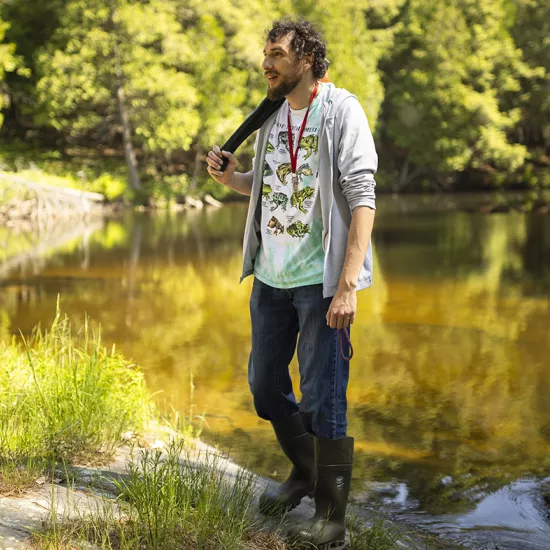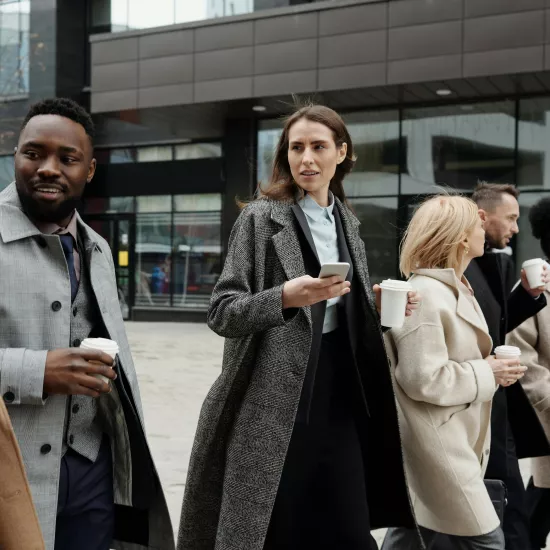UTM biotechnology students advancing digital health tech for children's care and rehabilitation

For children with disabilities and their families, advancements in digital health technologies are changing the landscape of care and rehabilitation. From big data and artificial intelligence to machine learning and rapid development of new technologies, this space is providing incredible opportunities for people around the globe, and in the case of Institute for Management and Innovation (IMI) Master of Biotechnology Digital Health Technology (DHT) students, an opportunity to help children with a unique set of challenges.
Through a partnership with Holland Bloorview Kids Rehabilitation Hospital, Assistant Professor Jayson Parker is helping his students and industry partners to move specialized projects in digital health tech for kids forward.
Through their Digital Ethnography in Health course, MBiotech students in the DHT stream are given the opportunity to embark on real-world, real-time projects with the rehabilitation hospital.
Students have the opportunity “to interact with stakeholders in a real-world setting, providing us with challenges that we wouldn’t be able to experience if we only worked within the classroom,” says Imran Rhemtulla, an MBiotech candidate in the course.

Students tackle user analysis, engage with hospital administrators including project and technical leads, and come up with solutions to the opportunities they discover, which are then presented to the Holland Bloorview team.
Of particular value to the students, says Parker, is exposure to the research and technology commercialization arm of a hospital. This goes beyond the classroom and real-world, giving them experience within a unique and sensitive work environment.
This year, one of the teams worked on hollyTM, an app that supports autistic children and their caregivers. Rhemtulla, Crystal Valdez and Naina Jain worked to develop new data visualizations for the hollyTM software, which uses biometric data to provide real-time information on a child’s emotional arousal level through wearable technology.
What makes this app particularly special, says the team, is “the fact that the algorithm can learn from its users and become more of a predictive support technology in the future, thus further enabling independence for an individual's emotional regulation support.”
The team had an opportunity to connect deeply with members of the Autism Spectrum Disorder community, as well as project leaders and other partners.
“We were able to learn more about people affected by the challenges that come with ASD,” says Rhemtulla. This project, they hope, “empowers patients and caregivers to engage with [the child’s] emotional well-being, which can ultimately improve their emotional awareness and regulation.”
Another team worked on Bootle Blast, a movement tracking videogame for children with motor skills impairment. The game serves to encourage the development of fine motor skills through close examination of brain activity patterns.

Breanna Vasko, Alana McPhail and Selena (Ning) Xu worked to come up with ways to make the data actionable and relevant for a range of engaged parties and help project members to see the types of clinical projects that could move the technology forward.
“We chose this project as it was a very open-ended goal with space to be creative”, says Vasko. The team particularly enjoyed the patient outreach component, and the opportunity to “make physiotherapy an engaging experience for the patients.”
These kinds of projects are tremendously valuable for all involved, not just the students.
For partners, these serve as a pipeline for talent, sharing of ideas, and an opportunity to engage with students who are learning the latest in digital health technology in real time.
For faculty, it’s an opportunity to see their students thrive outside the classroom environment, applying theory to practice on projects with potential to change people’s lives.
For Parker, who continues to lead the course and guide the students along the way, he looks forward to continuing to align innovative projects like these with product development in the future, including medical devices, apps and software in digital health.



